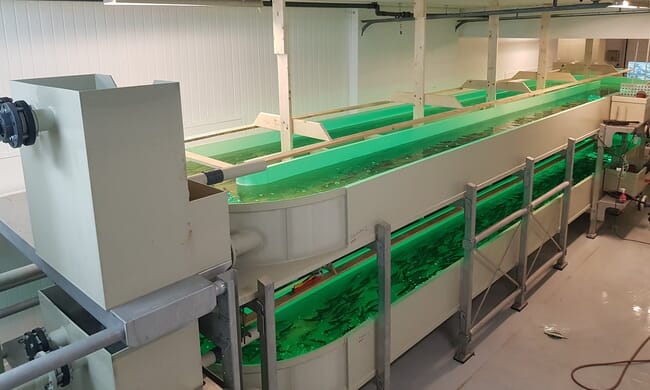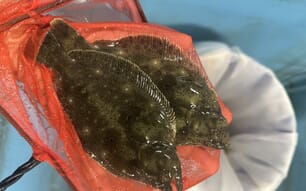
The unique system has been successfully used to grow species including salmon, turbot and sole. © BlueGen
BlueGen has just announced an agreement which will see the farm designed by SIFT Group, whose Super Intensive Farming Technology (SIFT) is currently being trialled in a 1,000-tonne-capacity pilot farm for Atlantic salmon in Tromsø. If successful, it plans to increase production to 10,000 tonnes of salmon a year.
SIFT, which has been under development since 2016, features stacked raceways operating with controlled water flow. According to the company the design allows for stocking densities of up to 300 kg/m3 .
“The agreement with BluGen is very important for us,” said Dr Torbjørn Trondsen, CEO and co-founder of SIFT Group, in a press release. “After many years of research and development, the vertical SIFT design has proven to deliver cost-efficient production factors for both bottom-dwelling and pelagic aquaculture fish species by high utilisation of land, with far more fish production per square meter of land, better degassing, and less use of make-up water. The agreement with BluGen is our first international delivery that will be implemented at the same time as we are building our own SIFT farm for salmon in Norway.”
According to BluGen, in addition to SIFT Group’s own pilot facilities, various farms in Europe have been using the SIFT system for commercial production of sole and turbot for the past decade, with optimal economic results and very low mortality rates.
BluGen will be adopting a similar systems design, but with upgraded technological components.
“It has been a long discovery process in identifying our farming system and RAS technology partner. We spent a significant amount of time reviewing SIFT, both on and off site. Ultimately, we decided that SIFT Group’s technology, design, team and approach are the best fit and specific to our species and project. We’re very happy to be working with SIFT Group,” stated Dr Woo-Jai Lee, BluGen Founder and CEO.
Three-phase construction
The new agreement pertains to the first of three project stages, which relates to pre-documentation and design planning of SIFT modules for BluGen’s production facility. While exact figures are not yet determined, harvest capacity is estimated to be at least 1,700 tonnes per year, in addition to juvenile production. But, with optimal operations, BluGen hopes that it may double its originally anticipated production capacity, based on previous discussions with other RAS technology providers.
Stage two will be limited to the installation and running of the testbed, which will allow BluGen and SIFT Group to mitigate risk and allow room for fine-tuning before full-scale delivery. The third and final stage will involve full-scale delivery of the rest of the production facility.
According to BluGen, the timing is right, as the structure that will house the system is already 75 percent complete and should be finished by July. Meanwhile the company is anticipating delivery and installation of the testbed at the beginning of July. Delivery and build-out for full production is to follow in 2024 if the testbed run is successful.


